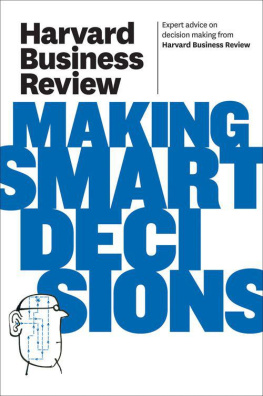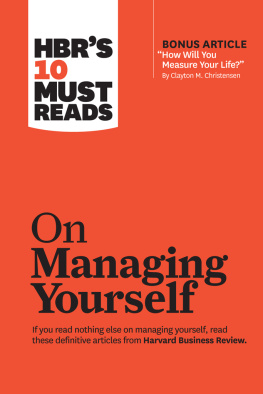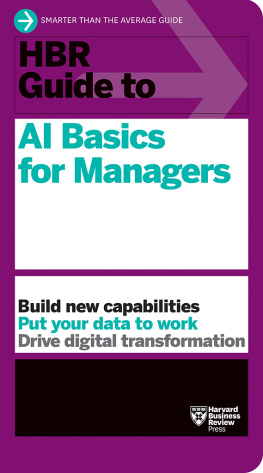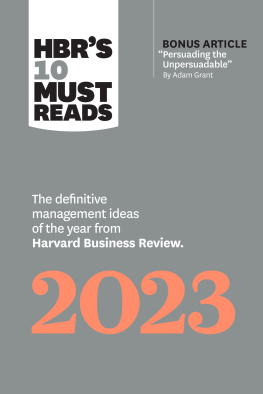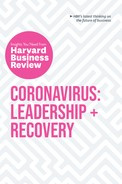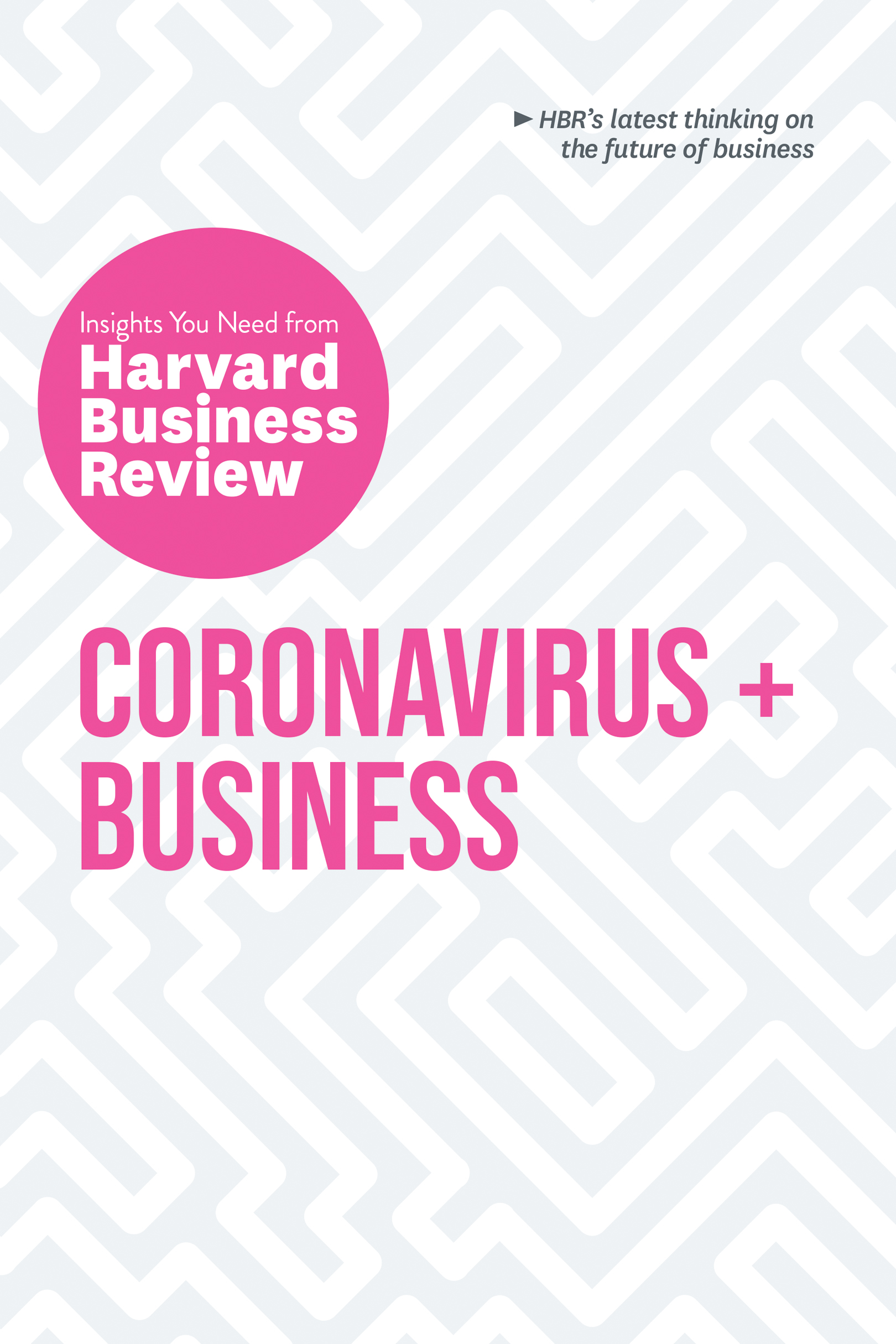We launched the Insights Series to provide our readers with HBRs latest thinking on the future of businesswe never foresaw a topic that would have such a sudden and severe impact on business and society as a whole.
HBR is dedicated to helping companies, managers, and others make sense of this uncertain situation. We will continue to publish new articles on coronavirus and business each day, free for all readers, at hbr.org/coronavirus.
Business is changing. Will you adapt or be left behind?
Get up to speed and deepen your understanding of the topics that are shaping your companys future with the Insights You Need from Harvard Business Review series. Featuring HBRs smartest thinking on fast-moving issuesblockchain, cybersecurity, AI, and moreeach book provides the foundation introduction and practical case studies your organization needs to compete today and collects the best research, interviews, and analysis to get it ready for tomorrow.
You cant afford to ignore how these issues will transform the landscape of business and society. The Insights You Need series will help you grasp these critical ideasand prepare you and your company for the future.
HBR Press Quantity Sales Discounts
Harvard Business Review Press titles are available at significant quantity discounts when purchased in bulk for client gifts, sales promotions, and premiums. Special editions, including books with corporate logos, customized covers, and letters from the company or CEO printed in the front matter, as well as excerpts of existing books, can also be created in large quantities for special needs.
For details and discount information for both print and ebook formats, contact .
Copyright 2020 Harvard Business School Publishing Corporation
All rights reserved
No part of this publication may be reproduced, stored in or introduced into a retrieval system, or transmitted, in any form, or by any means (electronic, mechanical, photocopying, recording, or otherwise), without the prior permission of the publisher. Requests for permission should be directed to , or mailed to Permissions, Harvard Business School Publishing, 60 Harvard Way, Boston, Massachusetts 02163.
The web addresses referenced in this book were live and correct at the time of the books publication but may be subject to change.
Cataloging-in-Publication data is forthcoming.
eISBN: 978-1-64782-040-4
Contents
- Twelve lessons on analyzing data, communicating information, and protecting your employees.
- by Martin Reeves, Nikolaus Lang, and Philipp Carlsson-Szlezak
- From maximizing employees ability to work remotely to revising benefits policies.
- by Jeff Levin-Scherz and Deana Allen
- Its late in the game, but there are still steps you can take.
- by James B. Rice, Jr.
- Eight factors leaders should consider.
- by Peter Susser and Tahl Tyson
- Leaders can approach this challenging time with flexibility, transparency, and compassion.
- by Atta Tarki, Paul Levy, and Jeff Weiss
- How to maintain the flow of supplies to quarantined communities.
- by Chengyi Lin
- Twelve lessons for the rest of the world.
- by Martin Reeves, Lars Fste, Cinthia Chen, Philipp Carlsson-Szlezak, and Kevin Whitaker
- A Q&A with Harvard Business School professor Tsedal Neeley.
- by Tsedal Neeley
- Leaders need to adapt to the new normal.
- by Barbara Z. Larson, Susan R. Vroman, and Erin E. Makarius
- Twelve keys to success.
- by Bob Frisch and Cary Greene
- Stop the multitasking already!
- by Justin Hale and Joseph Grenny
- Identify your key constituents and tailor your message appropriately.
- by Paul A. Argenti
- Do you have enough information to take action?
- by Art Markman
- Three strategies for taking care of your mental health.
- by Rasmus Hougaard, Jacqueline Carter, and Moses Mohan
- Transparency is crucialeven if your reputation takes a short-term hit.
- by Amy C. Edmondson
- Lessons from one local banks response to Hurricane Katrina.
- by Bill Taylor
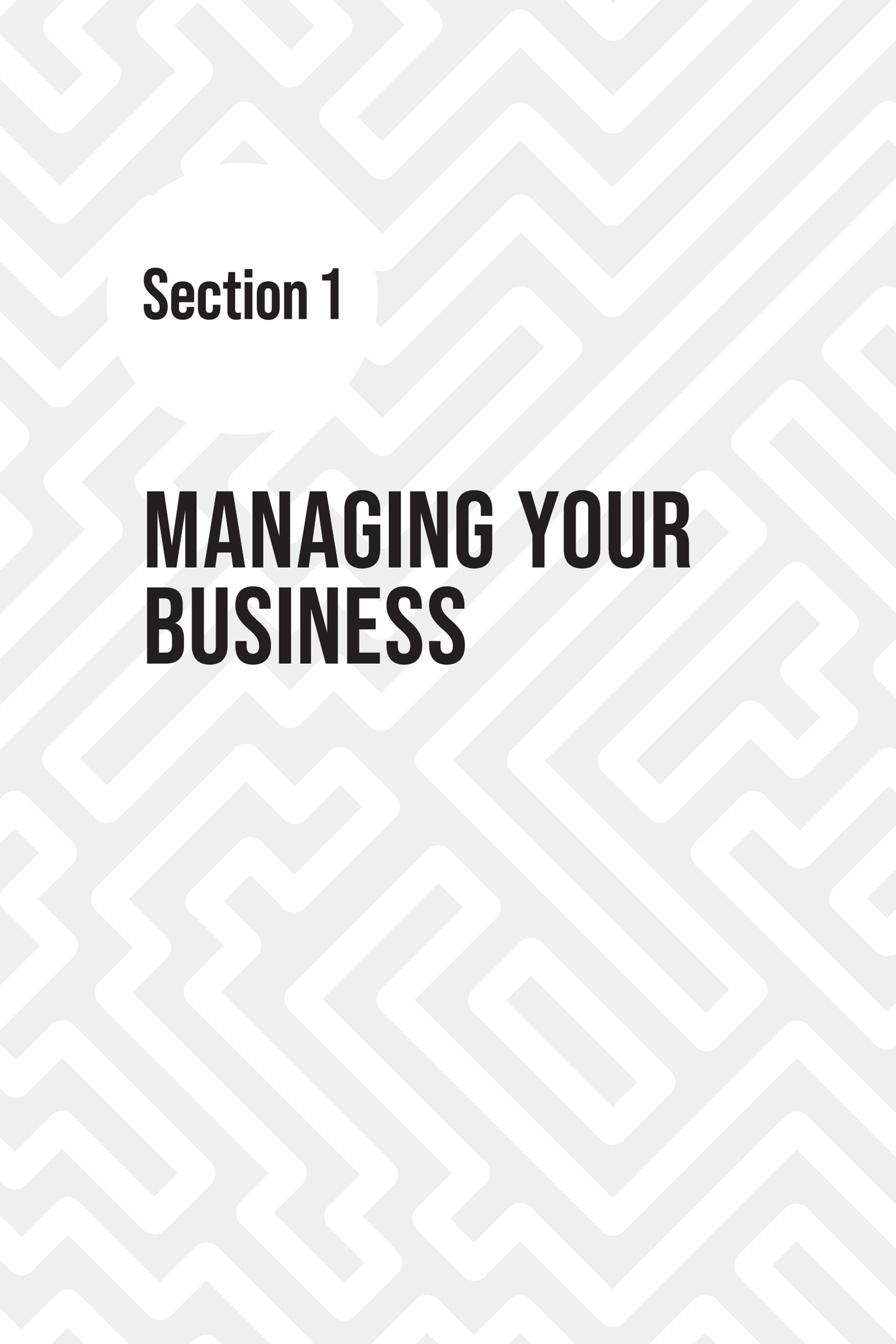
LEAD YOUR BUSINESS THROUGH THE CORONAVIRUS CRISIS
by Martin Reeves, Nikolaus Lang, and Philipp Carlsson-Szlezak
The Covid-19 crisis has now reached a new critical phase where public health systems need to act decisively to contain the growth in new epicenters outside China.
Clearly, the main emphasis is and should be on containing and mitigating the disease itself. But the economic impacts are also significant, and many companies are feeling their way towards understanding, reacting to, and learning lessons from rapidly unfolding events. Unanticipated twists and turns will be revealed with each news cycle, and we will only have a complete picture in retrospect.
Nevertheless, given the very different degrees of preparedness across companies, the further potential for disruption, and the value of being better prepared for future crises, its worth trying to extract what we have learned so far. Based on our ongoing analysis and support for our clients around the world, we have distilled the following 12 lessons for responding to unfolding events, communicating, and extracting and applying learnings.
1) Update intelligence on a daily basis.
Events are unfolding with astounding speed, and the picture changes on a daily basis. Only several days ago, it looked like the outbreak was mostly confined to China and was being brought under control. More recently, a number of fast-growing epicenters of infection have sprung up beyond China, signaling a new phase and potentially necessitating new strategies of mitigation rather than containment. Our team initially decided to communicate updates every 72 hours, but we moved to a daily cycle, not only for updating data, but also for reframing our overall perspective.
2) Beware of hype cycles / news cycles.
News organizations often focus on whats new rather than the big picture, and they sometimes dont distinguish between hard facts, soft facts, and speculation. Yesterdays news is likely to frame how your organization thinks about the crisis today. When exposed to fast changing information, be it a new technology or an emerging crisis, we have a systematic tendency initially to overlook weak signals, then to overreact to emerging issues before we eventually take a more calibrated view. As you absorb the latest news, think critically about the source of the information before acting on it.


